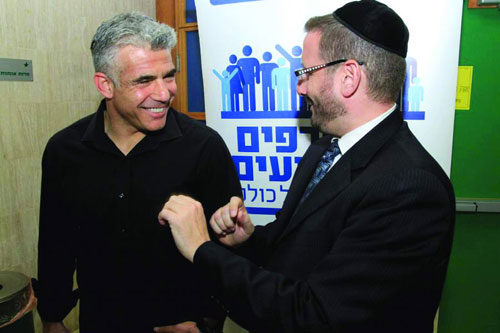.jpg) I recently sat down with newly elected member of the Israeli Knesset (Parliament) Rabbi Dov Lipman to discuss a variety of (mostly) non-political issues. Rabbi Lipman grew up in Silver Spring, Maryland, and is the first American-born member of Knesset in almost 30 years. He is an ordained rabbi, a graduate of Baltimore’s Ner Israel Rabbinical College in Baltimore, and received a master’s degree in education from Johns Hopkins University.
I recently sat down with newly elected member of the Israeli Knesset (Parliament) Rabbi Dov Lipman to discuss a variety of (mostly) non-political issues. Rabbi Lipman grew up in Silver Spring, Maryland, and is the first American-born member of Knesset in almost 30 years. He is an ordained rabbi, a graduate of Baltimore’s Ner Israel Rabbinical College in Baltimore, and received a master’s degree in education from Johns Hopkins University.
GB: I enjoyed watching your inaugural speech in the Knesset. You had a very American ending when you said, “G-d bless the State of Israel.” Sadly we are not accustomed to hearing the Lord’s name mentioned much in Israeli politics.
DL: This is one of my areas of focus: let’s bring G-d into the conversation. Yesterday we had a discussion in the Knesset about Pollard and 31 members of the Knesset got up to speak. Not one person said a word about G-d. Where is G-d? So I made a few last-minute revisions to my speech and went up to the lectern to make a plea to President Obama. Then I made a plea to Am Yisrael to join me every single morning to say a tefillah on Jonathan’s behalf. We are doing everything we can do, everything seems logical, and yet it’s still not working: Pollard is still incarcerated. It’s time that we pray for rachamei shamayim (heavenly mercy). No one in the Knesset is talking about G-d. Even the charedi leadership is barely mentioning G-d, they’re only talking about Torah. But that’s backwards! Torah is one of the three things that bring us closer to G-d; Torah is not a means unto itself.
GB: Did you honestly ever think you’d become a member of the Knesset or was it always in the back of your mind?
DL: It wasn’t a goal of mine until the Orot Banot situation (the very sad episode of the religious fanatics verbally and physically abusing elementary school students) last year. After the problems began, we went to the police, we went to the Minister of Public Security, we went to the Prime Minister, and they could have easily solved the problem but they chose to look away. First of all I saw how easily you can solve problems, and second I saw that things are corrupt and the system has to change. That’s when I felt that I’d love to enter the Knesset and be a part of the solution.
GB: Let’s discuss your role models.
DL: My father was my role model. He was a federal judge and a community activist. My goal is that as my children get older and face important life decisions, they will see the example that I set as being a person who cared but didn’t just complain—rather I did something about the problems, tried my best to make things better. That’s what I saw in my father. He took a lot of flak, but he had his belief system and he tried to make a difference. I hope my children see that quality in me, too. I also learned from my father the important message of achdut (unity)—not just worrying about your own sector but the importance to look out for all of Am Yisrael. I hope I can live up to my father’s extraordinary standards and continue to instill these life lessons in my children.
GB: What’s your dream?
DL: My dream is that Israel could be a place where everybody respects each other and feels proud to be Jewish.
GB: Any message those of us who live in the United States?
DL: I think that people in America should be raising their children to move to Israel. I am not a person who says that everyone has to make aliyah. You have your job, your family, your obligations. I understand that, but we should be raising the next generation to move to Israel. In Sefer Devarim (Deuteronomy) the Torah says the word Israel more than fifty times not even connected to a mitzvah. It’s just the place where the Jews are supposed to go.
GB: Any message to olim or potential olim?
DL: One of my roles in the Knesset is to make things easier for English-speaking olim and there are a few things already in the works. But the bigger message is that sometimes you just have to throw yourself into things. The challenges are here. Living in Israel is exhilarating and I invite everyone to join us.
GB: Let’s talk about the importance of making your mark in this world.
DL: Everybody can effect change. It doesn’t have to be in the Knesset. You have to have the courage to stand up for what you believe in and do something about it. It can be in your shul, in your children’s school, it can be in your block civic association or it can be in politics. Everybody can do it but the key is to always ask yourself, “Aside from the fact that I’m going to work to make a parnassa—which is not insignificant—what am I doing to make a difference?” I have taught thousands of children, and I sincerely believe that every person has the ability to make a difference in some way. Always ask yourself: Am I doing that? What more can I do to make things better? Everyone has the ability in their own unique way to make their mark and help better the world.
By Gedaliah Borvick









